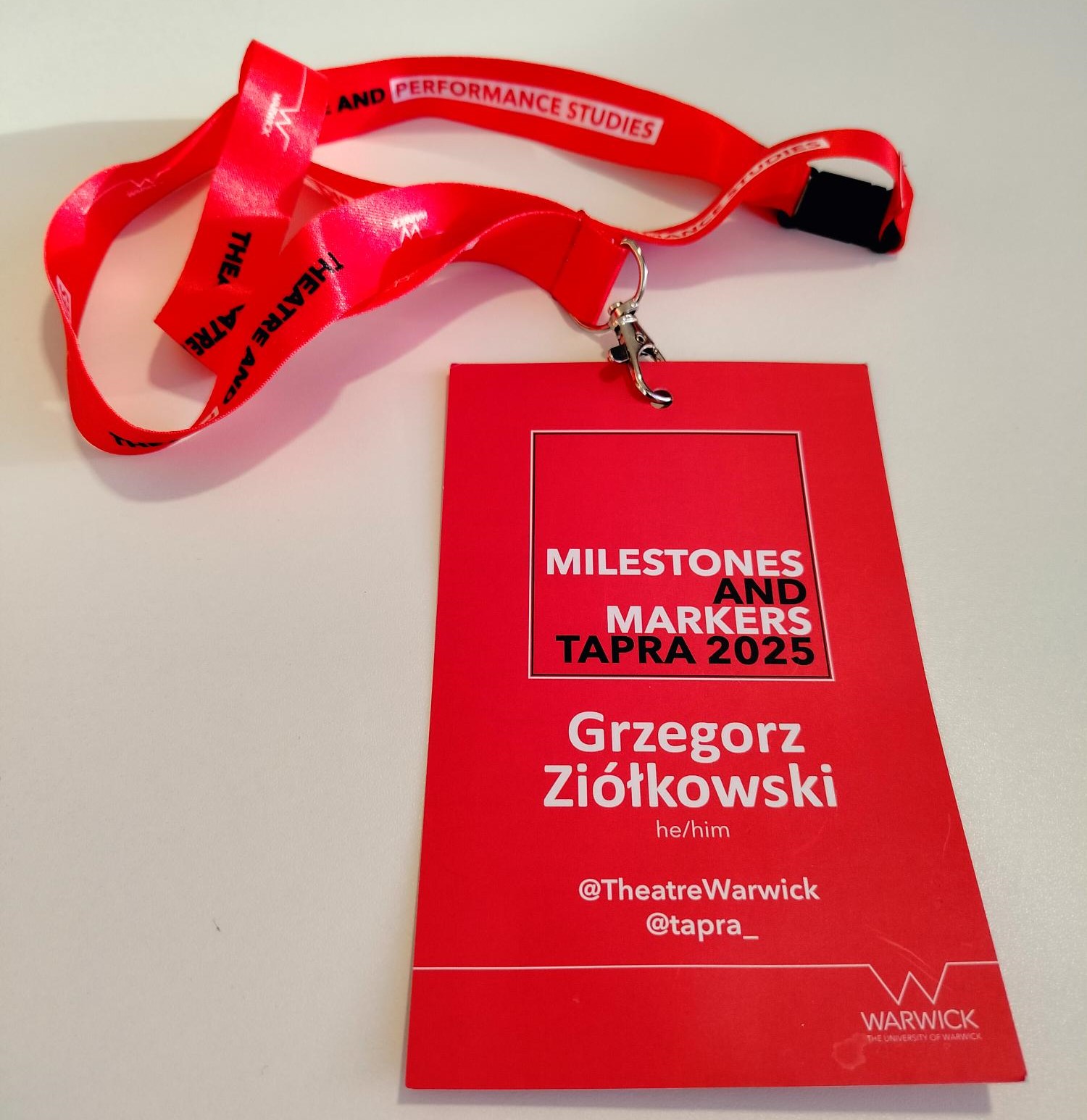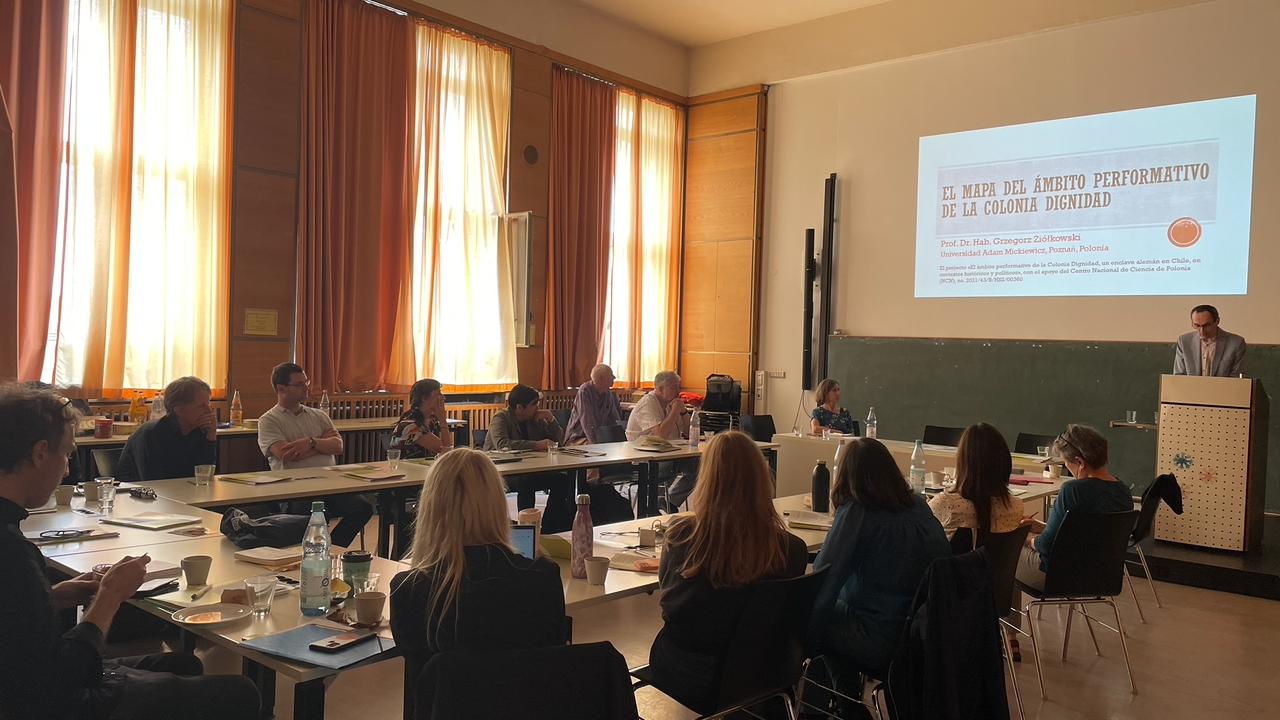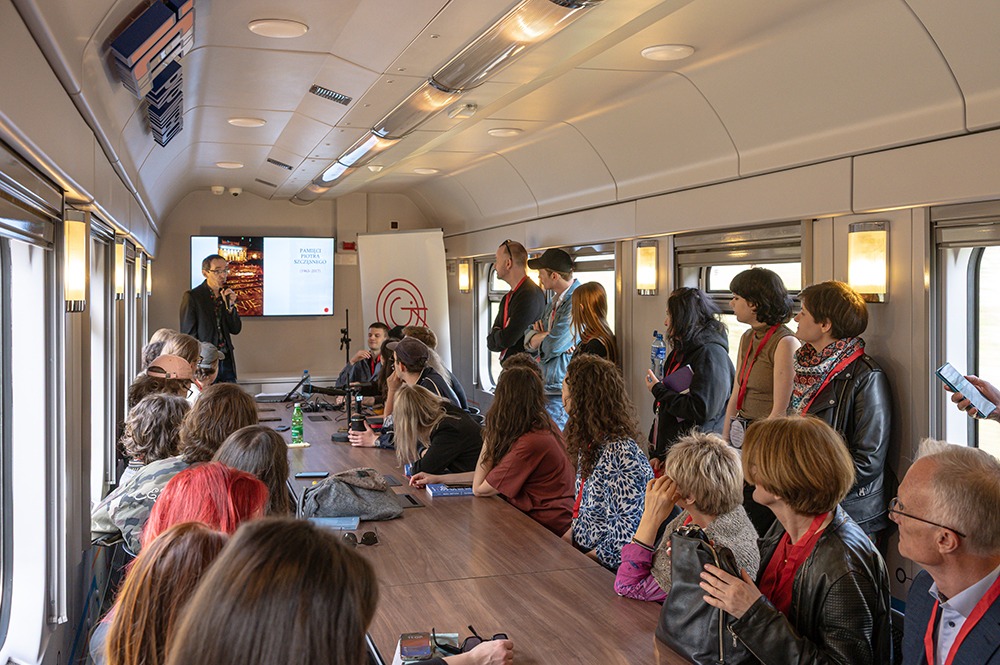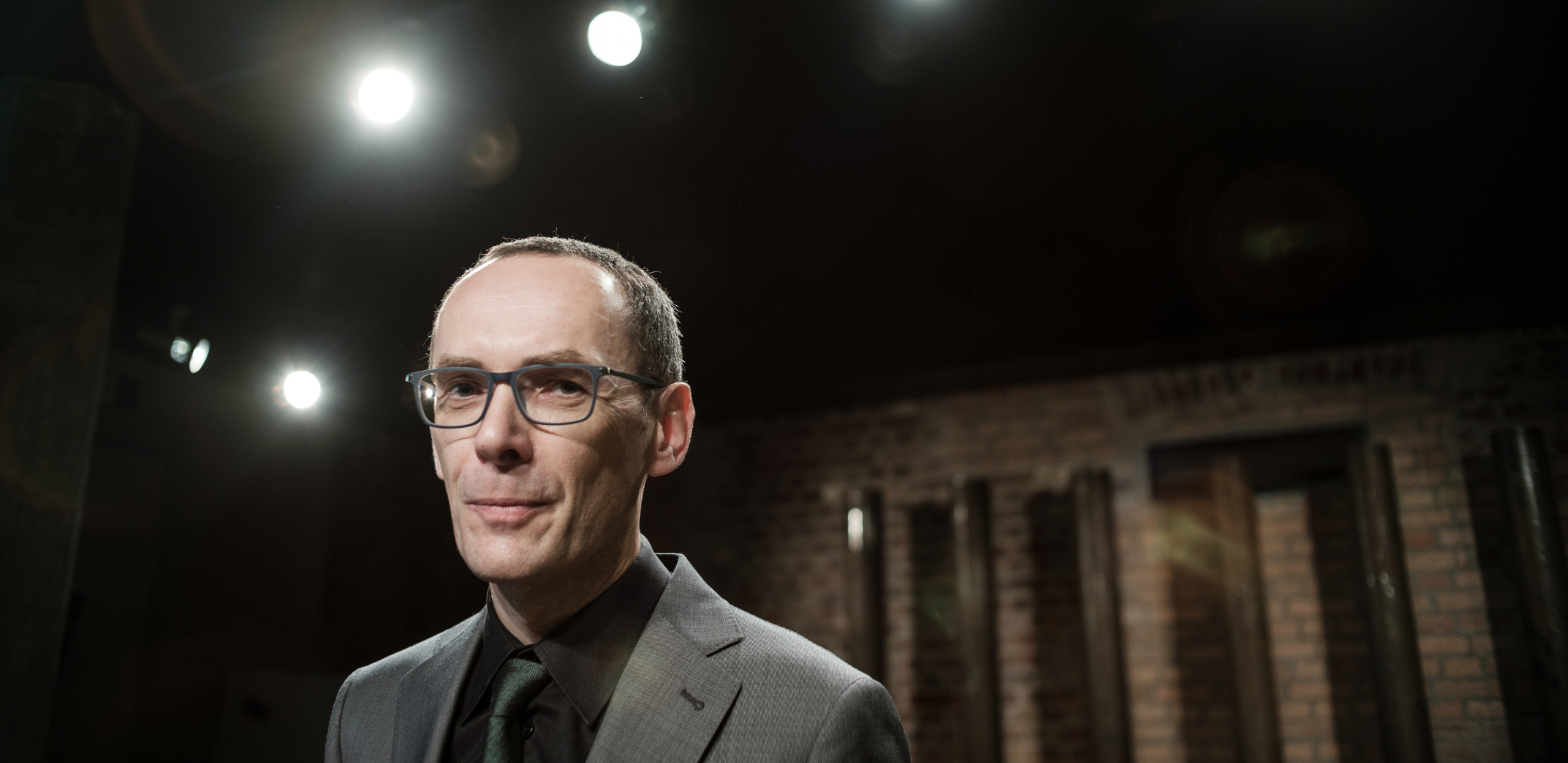TaPRA Warwick, 2025
“Solidarity-in-action: Chilean protest performance of funa beyond borders”
A conference Milestones and Markers of the Theatre and Performance Research Association (TaPRA), Warwick, UK, 27–29 August 2025
The paper is one of the results of Prof. Grzegorz Ziółkowski’s research project titled “The Performative Realm of ‘Colonia Dignidad,’ a German Enclave in Chile, in Historical and Political Contexts” (Performatywna strefa „Kolonii Godności”, niemieckiej enklawy w Chile, w kontekście historycznym i politycznym), financed by grant no. 2021/43/B/HS2/00360 from the National Science Centre (Narodowe Centrum Nauki, NCN) under its OPUS 22 Programme.
Abstract: In the face of many contemporary challenges, ranging from the destabilization of moral values in politics, through deregulated technological development, to ecological threats, it seems appropriate to bring to the fore the idea of solidarity, which can manifest itself in many different forms, including performative ones. Before this idea became the driving force behind the trade union movement in Poland in the early 1980s, it was embodied in Chile in response to state violence during Pinochet’s civil-military dictatorship (1973–90). After the transition to democracy, progressive Chileans developed a grassroots performative practice called funa to counter the lack of justice in the process of reckoning with the murderous regime. Funa is an action of the collective public shaming of the perpetrators of politicized violence in those criminal cases where the justice system has failed. The verb ‘funar’ means to ‘disclose’ or ‘expose’ in Chileno (Chilean-Spanish) and originates from Mapudungún (the language of the Indigenous Mapuche), where it designates something that rots. The paper analyses those funas which went beyond the borders of Latin America and were carried out in Germany between 2006 and 2023 as a call for justice and a celebration of solidarity. These actions embraced not only the traditional paraphernalia of protest performances, but also many cultural forms, including the traditional Chilean cueca (pair dance), danced alone to condemn the Pinochet dictatorship’s enforced disappearance strategy. All actions being analysed were aimed against the impunity of the two fugitive top echelons of Colonia Dignidad (Colony of Dignity), a pseudo-religious German criminal community which operated in Chile from the early 1960s and played an important role in the regime’s apparatus of repression. The example of those Chileans and Germans who joined forces in these subversive and transgressive acts reaffirms that confronting serious challenges requires teamwork, mutual support and the cultivation of solidarity; it requires solidarity-in-action.

iECD Berlin, 2025
“El mapa del ámbito performativo de la Colonia Dignidad” (The Map of the Performative Realm of Colonia Dignidad)
A workshop titled Colonia Dignidad abordaje histórico y cultural: testimonios y otras fuentes para la creación de medios digitales y exposiciones (Colonia Dignidad – historical and cultural reappraisal: testimonies and other sources for the development of digital media and exhibitions; Colonia Dignidad – historische und kulturelle Aufarbeitung: Zeugnisse und andere Quellen für die Entwicklung von digitalen Medien und Ausstellungen), the Lateinamerika Institut, Freie Universität Berlin (Institute for Latin American Studies, Free University of Berlin, FUB), Germany, 27 June 2025
The event aimed to discuss the historical and cultural approach to the Colony of Dignity in the context of the project “Interactive memories of Colonia Dignidad. A Chilean-German cooperation for historical and cultural reappraisal (iECD)” (Interaktive Erinnerungen an die Colonia Dignidad. Eine chilenisch-deutsche Kooperation zur historischen und kulturellen Aufarbeitung (iECD)) and create a space for an academic exchange between experts in this area.
At the invitation of Prof. Stefan Rinke, director of the Lateinamerika Institut (FUB), and Dr. Evelyn Hevia Jordán (FUB).
The presentation is one of the results of Prof. Grzegorz Ziółkowski’s research project titled “The Performative Realm of ‘Colonia Dignidad,’ a German Enclave in Chile, in Historical and Political Contexts” (Performatywna strefa „Kolonii Godności”, niemieckiej enklawy w Chile, w kontekście historycznym i politycznym), financed by grant no. 2021/43/B/HS2/00360 from the National Science Centre (Narodowe Centrum Nauki, NCN) under its OPUS 22 Programme.
Resumen: La ponencia comenzará con una breve introducción al concepto multidimensional de «performance», que originó en los estudios teatrales anglosajones y se ha consolidado en muchos idiomas, entre ellos el alemán y el español. A continuación, se ofrecerá una visión general del ámbito performativo de Colonia Dignidad, ilustrada con material iconográfico y breves grabaciones audiovisuales. Esta parte central se dividirá en dos secciones principales: en la primera, se identificarán y comentarán brevemente siete tipos diferentes de performances de la Colonia y, a continuación, se superpondrá un calendario a estas diferentes áreas. La periodización se corresponde a los cinco periodos identificados por Jan Stehle en su publicación seminal Der Fall Colonia Dignidad (2021), recientemente traducida al castellano (2025). Por último, se intentará responder a la pregunta clave planteada por Evelyn Hevia Jordán en 2023: «¿Cómo todo esto fue posible?». Es una pregunta que debería hacerse cualquiera que se haya abordado seriamente el tema de la Colonia Dignidad. En resumen, se llegará a la siguiente conclusión: la Colonia Dignidad fue (y la llamada «Villa Baviera» sigue siendo) un ejemplo exitoso de fraude y mistificación performativa.
 Photograph by Evelyn Hevia Jordán
Photograph by Evelyn Hevia Jordán
IFTR Cologne, 2025
“Carnival elements as licensed transgression in Colonia Dignidad, a sinister German enclave in Chile”
A conference Performing Carnival: Ekstasis, Subversion, Metamorphosis of the International Federation for Theatre Research (IFTR), Cologne (Köln), Germany, 9–13 June 2025: Website
The paper is one of the results of Prof. Grzegorz Ziółkowski’s research project titled “The Performative Realm of ‘Colonia Dignidad,’ a German Enclave in Chile, in Historical and Political Contexts” (Performatywna strefa „Kolonii Godności”, niemieckiej enklawy w Chile, w kontekście historycznym i politycznym), financed by grant no. 2021/43/B/HS2/00360 from the National Science Centre (Narodowe Centrum Nauki, NCN) under its OPUS 22 Programme.
Abstract: Performative practices were an integral part of the complex activities of Colonia Dignidad, a pseudo-religious community that originated in North Rhine-Westphalia and operated in Chile from the early 1960s. For decades, it systematically committed numerous crimes and violated human rights. Through various public performances, including acrobatic displays and music concerts, the colony’s manipulative leader, Paul Schäfer, and his inner circle successfully cultivated the image of an orderly group focused on charity work, undoubtedly one of the key factors which enabled the group’s longevity and staying power. However, the community’s performative activities were directed not only outwards but also inwards. The latter in some cases resorted to the carnival tradition with its poetics of abundance, surprise and transgression, as well as astonishing metamorphoses, elaborate disguises and an upside-down world. This may seem paradoxical in a place where rank-and-file settlers suffered pervasive oppression, were subjected to constant surveillance, and were brought into line with beatings, electroshocks and psychotropic drugs. The paper will argue that transgressive elements in the colony’s inner performances were in fact licensed by those in power, and by allowing them to occur, group and individual energies were controlled in yet another way. This argument will be illustrated by two examples set in a historical context: an early performance of a demonstrative drowning of Santa Claus in the Perquilauquén river (1962?); and a performance (previously unmentioned in the literature on the subject) staged by young female colonists impersonating the area’s indigenous inhabitants, the Mapuche, shortly after Schäfer’s escape to Argentina (1997?).
The Liberation Train Warsaw–Gdańsk, 2025
“Solidarity in Action: The Aftermath of Self-Immolation as Exemplified by the Protest of Sebastián Acevedo (Chile, 1983)”
A guest lecture in a special conference carriage of the Liberation (Wyzwolenie) Festival Train travelling from Warsaw to Gdańsk as as part of the Lamentations (Lamentacje) Theatre Festival organised by the Polish Theatre in Warsaw and the Grotowski Institute in Wrocław, 15 April 2025
The lecture is one of the results of Prof. Grzegorz Ziółkowski’s research project titled “The Performative Realm of ‘Colonia Dignidad,’ a German Enclave in Chile, in Historical and Political Contexts” (Performatywna strefa „Kolonii Godności”, niemieckiej enklawy w Chile, w kontekście historycznym i politycznym), financed by grant no. 2021/43/B/HS2/00360 from the National Science Centre (Narodowe Centrum Nauki, NCN) under its OPUS 22 Programme.
Abstract: On 11 November 1983, Chilean worker Sebastián Acevedo Becerra set himself on fire in Concepción, demanding the release of his daughter and son, who had been abducted more than two days earlier by the CNI, Augusto Pinochet’s notorious intelligence service. Although Acevedo was acting on behalf of his children, his desperate act became a symbol of the suffering of all those whose loved ones disappeared without trace during the Chilean civil-military dictatorship (1973–90). Shortly after this dramatic event, a group of activists added his name to the name of the pacifist Movement Against Torture (Movimiento Contra la Tortura), which they had founded in August 1983. The self-immolation also inspired the creation of the Women’s Movement for Life (Movimiento Mujeres por la Vida). By the end of the dictatorship, both organisations carried out dozens of peaceful and pro-democracy protests, expressing their opposition to the military junta’s brutality and solidarity with the detained disappeared (detenidos-desaparecidos), their families and friends. The lecture reflects on the aftermath of self-immolation as the most radical form of protest and asks questions about the effectiveness of such actions.

Photograph courtesy of the Grotowski Institute
